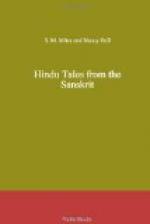Nobody was more surprised than Hari-Sarman himself. He guessed, of course, that there was a frog in the pitcher. And when the king had ended his speech, he said: “One thing I ask in addition to all that has been given me, that I may keep the pitcher in memory of this day, when my truth has been proved once more beyond a doubt.”
His request was, of course, granted; and he went off with the pitcher under his arm, full of rejoicing over his narrow escape. At the same time he was also full of fear for the future. He knew only too well that it had only been by a lucky chance that he had used the word Jihva in his first danger and Frog in the second. He was not likely to get off a third time; and he made up his mind that he would skip away some dark night soon, with all the money and jewels he could carry, and be seen no more where such strange adventures had befallen him. He did not even tell his wife what he meant to do, but pretended to have forgiven her entirely for the way she had neglected him when he was poor, and to be glad that their children were to be restored to them. Before they came from the farm their father had disappeared, and nobody ever found out what had become of him; but the king let his family keep what had been given to him, and to the end believed he really had been what he had pretended to be. Only Deva-Jnanin had his doubts; but he kept them to himself, for he thought, “Now the man is gone, it really does not matter who or what he was.”
15. What is the chief lesson to be learnt from this story?
16. What do you think it was that made Hari-Sarman think of his boyhood when he was in trouble?
17. Do you think he took the pitcher and frog with him when he left the city?
18. Do you think there was anything good in the character of Hari-Sarman?
STORY IX
The Hermit’s Daughter.
CHAPTER I
Near a town in India called Ikshumati, on a beautiful wide river, with trees belonging to a great forest near its banks, there dwelt a holy man named Mana Kanaka, who spent a great part of his life praying to God. He had lost his wife when his only child, a lovely girl called Kadali-Garbha, was only a few months old. Kadali-Garbha was a very happy girl, with many friends in the woods round her home, not children like herself, but wild creatures, who knew she would not do them any harm. They loved her and she loved them. The birds were so tame that they would eat out of her hand, and the deer used to follow her about in the hope of getting the bread she carried in her pocket for them. Her father taught her all she knew, and that was a great deal; for she could read quite learned books in the ancient language of her native land. Better even than what she found out in those books was what Mana Kanaka told her about the loving God of all gods who rules




